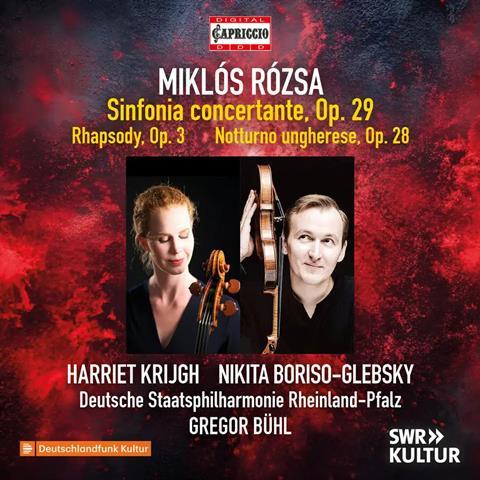There’s much to admire in this exploration of a Hungarian master

The Strad Issue: May 2025
Description: There’s much to admire in this exploration of a Hungarian master
Musicians: Harriet Krijgh (cello) Nikita Boriso-Glebsky (violin) Deutsche Staatsphilharmonie Rheinland-Pfalz/Gregor Bühl
Works: Rózsa: Sinfonia concertante; Notturno ungherese; Cello Rhapsody
Catalogue number: CAPRICCIO C5535
It’s unfair to think of Miklós Rózsa purely as a film composer, although perhaps inevitable with the likes of his score for Ben Hur gaining such widespread dissemination. These three works, however, showcase a more diverse outlook. His early years were inculcated with Hungarian folk music. An ardent admiration for the music of Kodály and Bartók is very evident in the early Cello Rhapsody, which is cast in an approachable Romantic language, the burnished autumnal tones of Harriet Krijgh’s Montagnana cello serving its soaring melodies to good effect.
Although indubitably well crafted, the Rhapsody doesn’t possess the distinctive material which makes the later Sinfonia concertante for violin and cello, composed for Heifetz and Piatigorsky, so memorable. Here, the invention is urgent, rhythmically pungent and striking – elements that are powerfully conveyed thanks to impressively virtuosic and strongly defined playing from Krijgh and Boriso-Glebsky, with excellent support from the orchestra.
The two soloists are ideally matched, responding to each other’s musical lines in true conversational style and shaping the second movement, a captivating set of variations, with great sensitivity. Their fervent and committed playing in the Bartókian finale, which oscillates effectively between lyrically reflective and propulsive dance rhythms, is utterly compelling. A real discovery.
JOANNE TALBOT
Read: Sentimental Work: Harriet Krijgh on Rachmaninoff’s Cello Sonata
The Strad Recommends: Harriet Krijgh: Dvořák, Elgar
Read: Dutch cellist Harriet Krijgh wins at Amsterdam Cello Biennale











































No comments yet